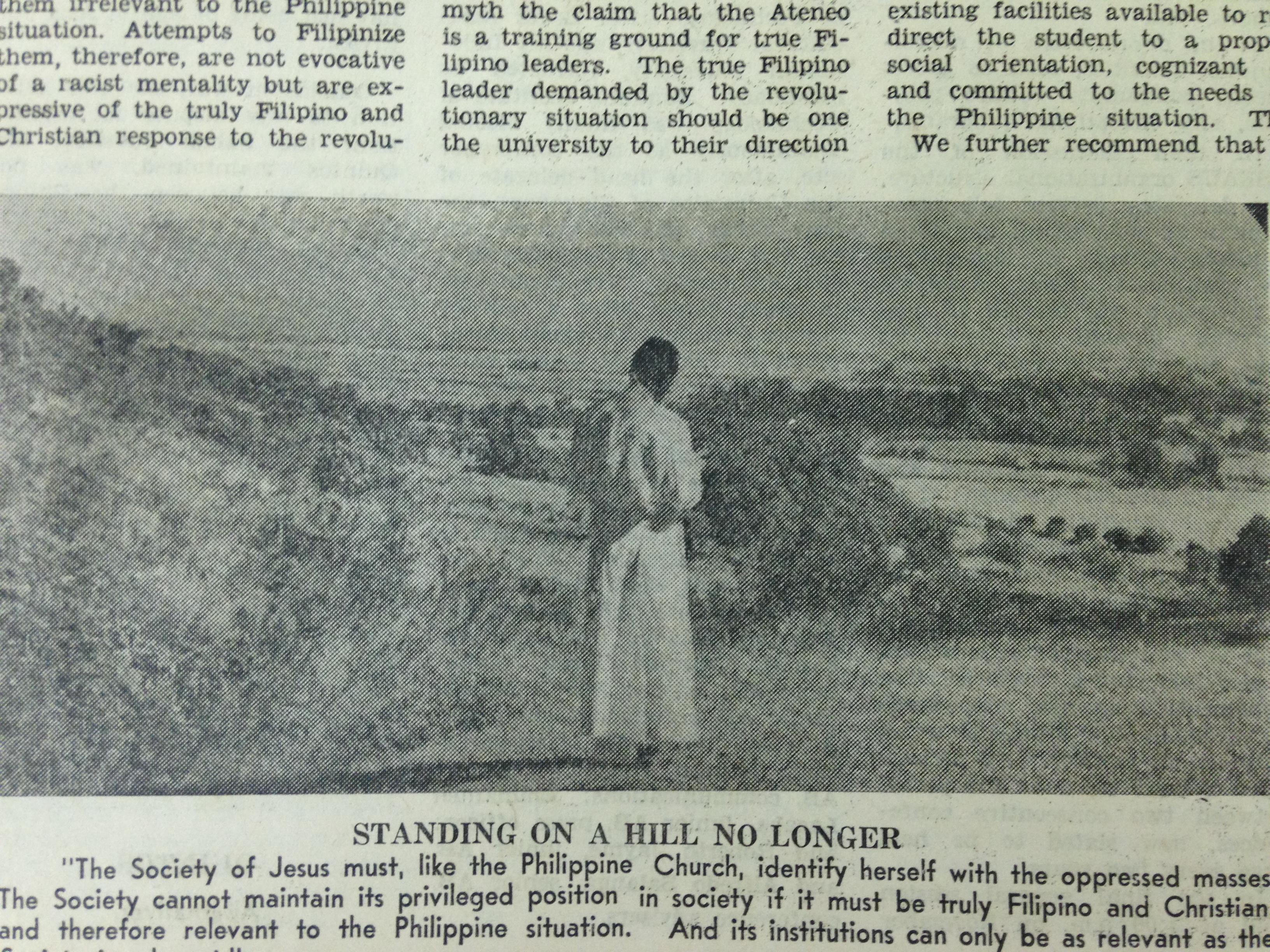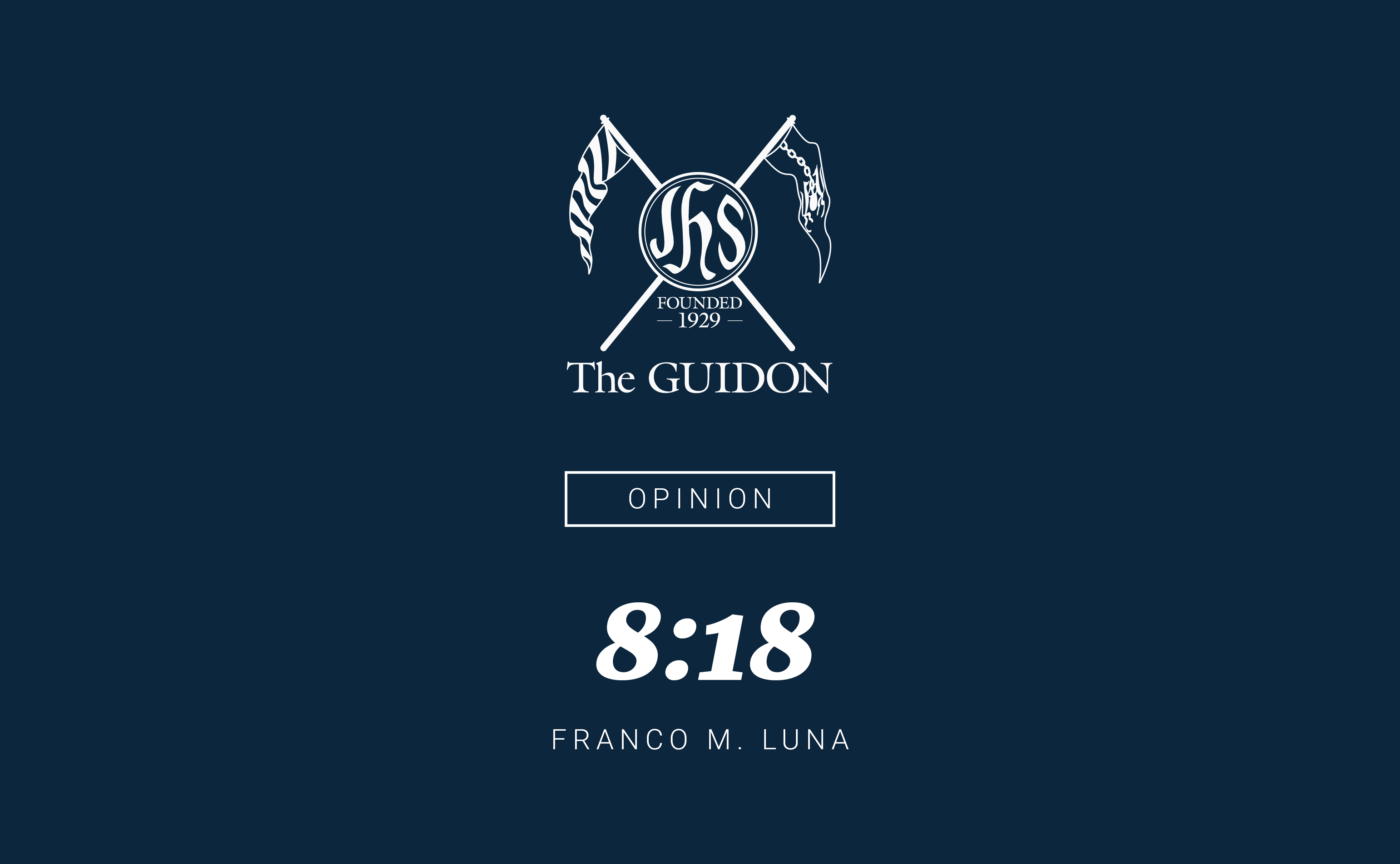
Exactly 50 years ago on November 27, 1968, The GUIDON published what came to be known as the Down from the Hill manifesto, an essay highlighting the need for Filipinization on campus.
Every facet of the University’s culture was promptly subject to question after this. The newspaper’s print issues following the manifesto included pieces questioning issues including the place of the American Jesuits1 in the University, the use of the English language in publications, and the lack of a Filipino dean2.
Almost instantaneously, the University’s administration acted on the demands and recommendations detailed in the manifesto. For instance, in 1969, the Ateneo College appointed its first Filipino President in Pacifico Ortiz, SJ. That same year, the first Filipino Philosophy class was taught by none other than Roque Ferriols, SJ. The following year on August 4, 1970, The GUIDON released its first print issue written mainly in Filipino.
These are but a few changes spurred by the tumultuous conditions that came before Down from the Hill: student demonstrations, rampant imperialism, and civil unrest. The Communist Party of the Philippines was formed a month after the manifesto’s publication. Outside the country, student-led revolts were raging all over Europe decrying communist military elites, while the Catholic Church was grappling with growing socio-political awareness from its flock, which later gave way to what is known today as liberation theology.
More than anything, Down from the Hill was a call to action for Ateneans to come down3 from their ivory towers. This era was ushered in by the premise that where privilege exists, so should the mindset of empathy.
Active-ism
Shortly after this publication, 1970 brought what came to be known as the First Quarter Storm. In 1972, then-President Ferdinand Marcos Sr. declared Martial Law under the guise of being a revolutionary leader.
Given the University’s stance on active nonviolence, direct—and that is to say, underground—activism with the communist party was not the only viable form of action. The Office for Social Concern and Involvement (OSCI), for example, was formed in 1975 with the vision of establishing outreach programs with rural communities and labor unions. Outside the political spectrum, the Atenean confronted the challenge of social justice with open arms.
The Atenean’s response was perhaps best made visible on September 21, 1982, when then-Ateneo Sanggunian President and youth leader Edgar Jopson was slain4 in a military raid for his active participation in the underground resistance to the brutal regime.
His is a story among many that are not told enough, all of which have roots in both the Atenean tradition, and arguably, the Down from the Hill manifesto. From this example and the martyrs following it, we see what the Atenean can do.
Fifty years later, it still cannot be denied that the manifesto catalyzed a chain reaction that was volatile, radical, but ultimately for the best.
Dark days
It’s also a reaction that we are beginning to need today more and more.
The writers of the manifesto wrote, “A revolutionary situation exists in the Philippines because the present social, political, and economic order does not make for a just society.” That was then, this is now; the days are dark under President Rodrigo Duterte’s regime and beyond. The Philippines of today draws stark comparisons to that of the Marcos regime, and the similarities are alarming.
In the past year, a price tag of Php 1,000 on our fundamental rights was nearly instated by 119 lawmakers who voted thrice to grant the aforecited budget to the Commission on Human Rights, while the lives of over twelve thousand civilians were taken amidst the ongoing state-encouraged war on drugs. Both the Constitution and the freedom of the press have been violated in the President’s acts of institutionalized sidestepping. Just last November 11, the Supreme Court officially ruled that Filipino and Panitikan subjects may be excluded from college core curricula, a testament to the continuing relevance of the Filipinization movement.
It’s been over two years since Duterte entered office and since a dictator was buried a hero. Innocent Muslims and Christians alike were just recently caught up in armed conflict in Mindanao after Islamic State forces laid waste to the city of Marawi. The motherland is falling, and the kids are not alright.
Bridging the gap
Even in our own backyard, the days are darker still.
Atop the hill today, our own staff and employees have faced off against our University administration after a deadlock was placed on Collective Bargaining Agreement negotiations between the two parties. The Ateneo Employees and Workers Union then declared strike for the first time in decades.
Meanwhile, the issue of sexual harassment just recently took the forefront of campus discussion after numerous posts on social media spurred swift and dramatic action from the University administration.
At the heart of it all is the Sanggunian, who had experienced consecutive electoral failures since 2013 until it was forced to draft a new constitution in 2016. The GUIDON noted that in the wake of the 2015 electoral failure, many expressed belief that this was inevitable, with the apparent truth of the matter simply being that “nobody cares.”
Today, we are in the aftermath of this constitution. Through the many lobbying efforts of student leaders in and out of the Sanggunian, the Atenean voice has been heard by Filipinos beyond Katipunan Avenue. In the face of a hostile national situation and even more dire circumstances on campus, students have time and time again voiced out their condemnation of the injustices around them.
All this came as a result of the student body’s push towards politicization, a movement that, save for a portion of the cultural implications, completely parallels our predecessors’ call for Filipinization and the circumstances surrounding it. Despite this, we are still labelled by society at large as an ivory tower for elitists in much the same way the manifesto of 1968 recognized and addressed.
Unity in diversity
What is the Atenean to do in the wake of these tumultuous realities? Our Jesuit education teaches us that the first step is caring, talking about it, and asking what we can do. This task includes all of us—not just the Sanggunian, and not just the leadership, advocacy, or politics-oriented organizations.
It would be easy to reduce this idea to the everyday push-and-pulls: between the internal and external issues, or between the arts and the sciences, both false dichotomies that are not uncommon sights on social media. It isn’t a question of how cultured, socially acceptable, or politically correct your views are, or where the brunt of your focus lies.
Instead, I see Down from the Hill, what it stood for, and what it later achieved as a reminder to look beyond our colloquial notions of what qualifies as “value-adding.” Conversely, it’s important not to blanket out the realities of today under a faux “good vibes only” mindset. In the same way as before, activism is possible in many forms, and to claim that one way is the right way would be a great disservice to society.
These days, it seems commonplace to think that these different areas of development and concern are mutually exclusive in their struggles and contributions. It is exactly this notion, that one is more important than the other, that hampers progress. Now more than ever, the world needs journalists and artists as much as it needs doctors and lawyers. The situation out there is just as dire, important, and impactful as the one in here. We need research, sustainability, diversity, and diplomacy, as much as we need rallying, organizing, and lobbying.
Down from the Hill revisited
More than just the need for direct and intentional action, Down from the Hill seemed to signify a growing sense of nationalism among Ateneans. The manifesto did not itself spawn this wave of action, rather, it bequeathed the consciousness5 behind it.
Many questions still surround the nature of the Atenean’s response to the world around us. Is it quantitatively enough? Is our approach the right one, and are we doing it for the right reasons?
I argue that even though it has not always been evident, it would not be fair to ask where that same consciousness today is, when the student body’s efforts are more visible than ever.
These days, I argue that a radical reformation of the entire University system is perhaps not what is needed. We may not need to go down from the hill if we are no longer firmly planted on it.
Instead, politicization must be a constant and collective push from the student population in the same way the Filipinization movement reimagined the culture of 1968. After all, the latter as a movement manifested the extent to which the University was in tune with the rapidly changing world.
Contrary to popular opinion, I believe the Ateneo has heeded the call of the Down from the Hill manifesto, and it will continue to long after today’s 50th anniversary. It’s been established that the Atenean can, but today’s situation once again warrants the question of if the Atenean will.
This is not a commentary on the state of things, nor is it an analysis on the culture we’ve so willingly submitted to. Instead, it is an appeal to care more, regardless of our chosen fields; to care not just widely, but deeply. This is not to say that we don’t, rather it’s to reinforce that we should, and to serve as a reminder that we must do so critically. Wherever you stand, remember to justify it.
The days are dark in today’s world, and we only lose when we do not bother.







